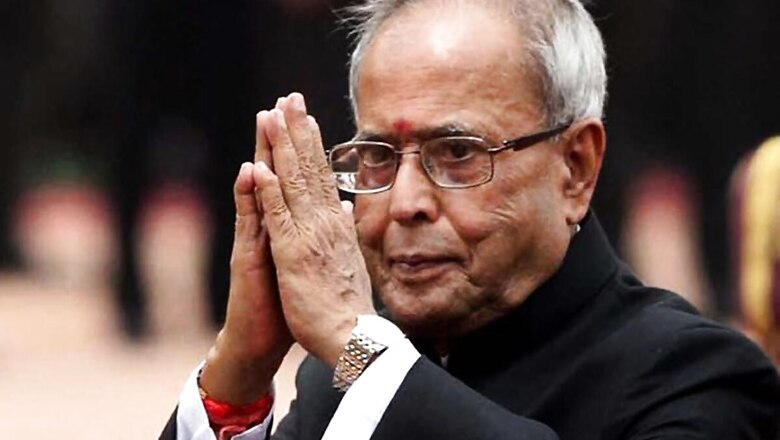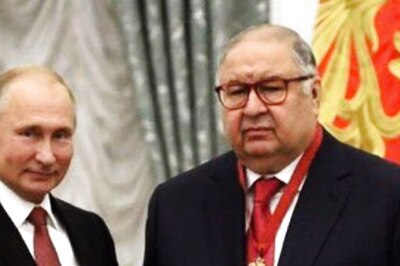'Meaningless Disruptions': Pranab Mukherjee On What Bothered Him About Parl Sessions In Recent Times

views
In his book – The Presidential Years, late Pranab Mukherjee, the former President of India, wrote about a few matters that disturbed him as much as the “culture of meaningless disruptions in Parliament and state assemblies”.
The Congress veteran, who spent decades in public life as a representative of the people, elucidated in his book the things that appalled him during Parliament sessions over the years.
No tolerance to callousness
Mukherjee said he was appalled to see the callousness with which disruptions were used as a “tool to hold a government accountable.” He wrote every people’s representative must bear in mind that they owe their membership of Parliament or assemblies to the people. “Ever since I started my parliamentary journey, I would be mesmerised listening to stalwarts in Parliament for hours and days, regardless of whether I was seated in the Treasury or Opposition benches. This practice helped me unite with the soul of this living institution and understand and appreciate the true value of debate, discussion and dissent,” he wrote.
The book also lists some of the most outstanding examples of healthy debates in Mukherjee’s opinion, like the proceedings of the Constituent Assembly of India between December 9, 1946, (when the Constituent Assembly first met) and January 26, 1950, (after which it ceased to exist and was replaced by the Provisional Parliament of India).
The Constituent Assembly had met several times to finalise the Constitution of India. Every article and clause and every provision was discussed and debated threadbare. Several members gave their opinions and raised objections vehemently, and seeking and receiving responses.
Mukherjee wrote the stalwarts who participated in these discussions belonged to a range of political affiliations and clashed with one another in the course of discussions, and yet all of them worked tirelessly towards the common goal of giving the country a Constitution that would deal with all sections of people without prejudice or undue favour.
“Dissent did not lead to disruption or deadlock; instead, it facilitated the creation of the best possible Constitution. In the years that followed, especially during Nehru’s prime ministership, the practice of debate, discussion and dissent nourished. Nehru not only encouraged convict of opinion but also respected it. Several opposition party leaders, including Atal Bihari Vajpayee, made a mark in the House because they were given the opportunity to freely express their thoughts and criticisms of the government of the day. Unfortunately, as time passed by, much of that democratic spirit was replaced by raucous,” the book mentions.
The disruptions are institutionalised
Regarding how disruptions were streamlined, Mukherjee said since parliamentary democracy began in India, particularly from the first Lok Sabha/Rajya Sabha in 1952, “every parliamentary session comprised 12 weeks of the Budget Session and six weeks each of the Monsoon Session and the Winter Session. These were the three normal sessions of Parliament in a year.”
With time, Mukherjee realised the proceedings were fraught with a “totally unacceptable culture of disruptions,” which harmed this system that came about by experience and dissent. The sessions, in his opinion, were marked by “meaningless disruptions” on “flimsy grounds” that rendered Parliament, a fundamental pillar of Indian democracy, “ineffective.” The institutionalisation of disruptions undermined democracy in a dangerous way, he wrote.
“These can hardly be considered effective parliamentary interventions, and are indeed the ultimate betrayal of commitment to the people of India. It is only through Parliament and legislative assemblies that governments are held accountable to the people. If these institutions become dysfunctional, it not only results in institutional paralysis but also has a ripple effect across the system,” he wrote.
He said he was surprised that disruptions did not even spare the Budget sessions. The trend of disrupting even the PM’s speech became more pronounced in the UPA 2 regime. He also expressed concern on several occasions about the drop in the number of days Parliament transacted business.
What the past says
Mukherjee wrote that in the 1950s and 60s, the average number of sittings was 127 days for the Lok Sabha and 93 days for the Rajya Sabha. “This is in sharp contrast to 2018, when the second leg of the Budget Session, which started on 5 March and ended on 6 April, saw virtually no business being transacted. This meant that not a single demand of any ministry was considered on the floor of the House,” he wrote.
In the earlier days, there were no department-related standing committees. “Despite the important role played by these parliamentary standing committees, their work cannot substitute that of the open session of Parliament. Debates and discussions on the floor of the House have their own impact and there is absolutely no excuse for not holding sessions over a period of time,” he said.
While reflecting on the reasons behind constant disruption of proceedings, he said it could be attributed to fractured electoral verdicts over 25 years — from 1989 to 2014. Mukherjee said the turbulent decade of 1989–99, that should have seen only three general elections (1989, 1994 and 1999) under normal circumstances, was witness to five elections (1989, 1991, 1996, 1998 and 1999).
The book further says that during this decade, Parliament, with a full tenure of five years, came into existence only once — in 1991, under the leadership of PV Narasimha Rao. The earlier government in 1989-91 was short-lived, just like the governments that came to power in 1996-98 and 1998-99. “Normalcy returned once again from 1999 onwards interruptions in the name of discussion and the Opposition’s opinions were dealt with contempt,” he said in the book.
Read all the Latest News, Breaking News and Coronavirus News here
















Comments
0 comment